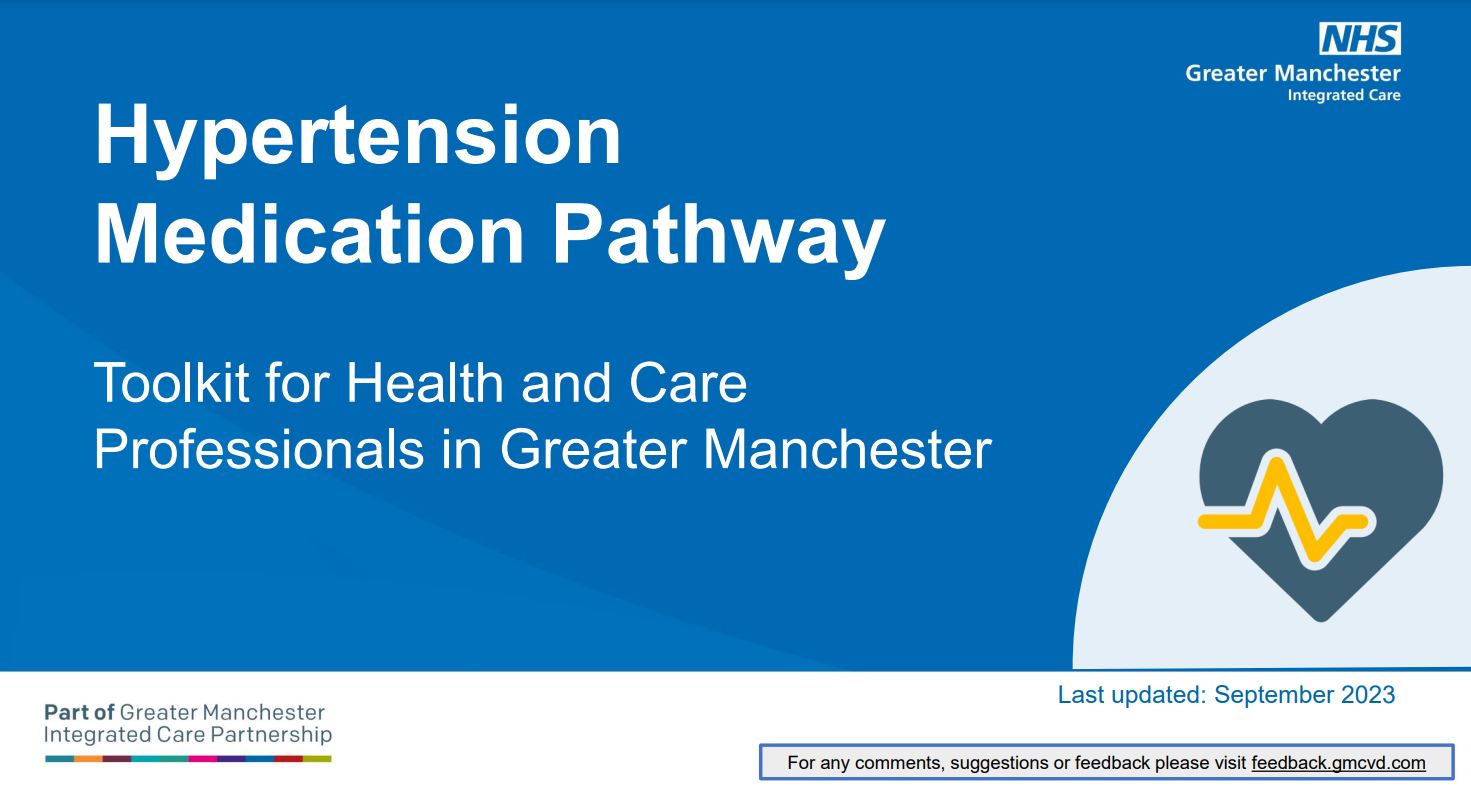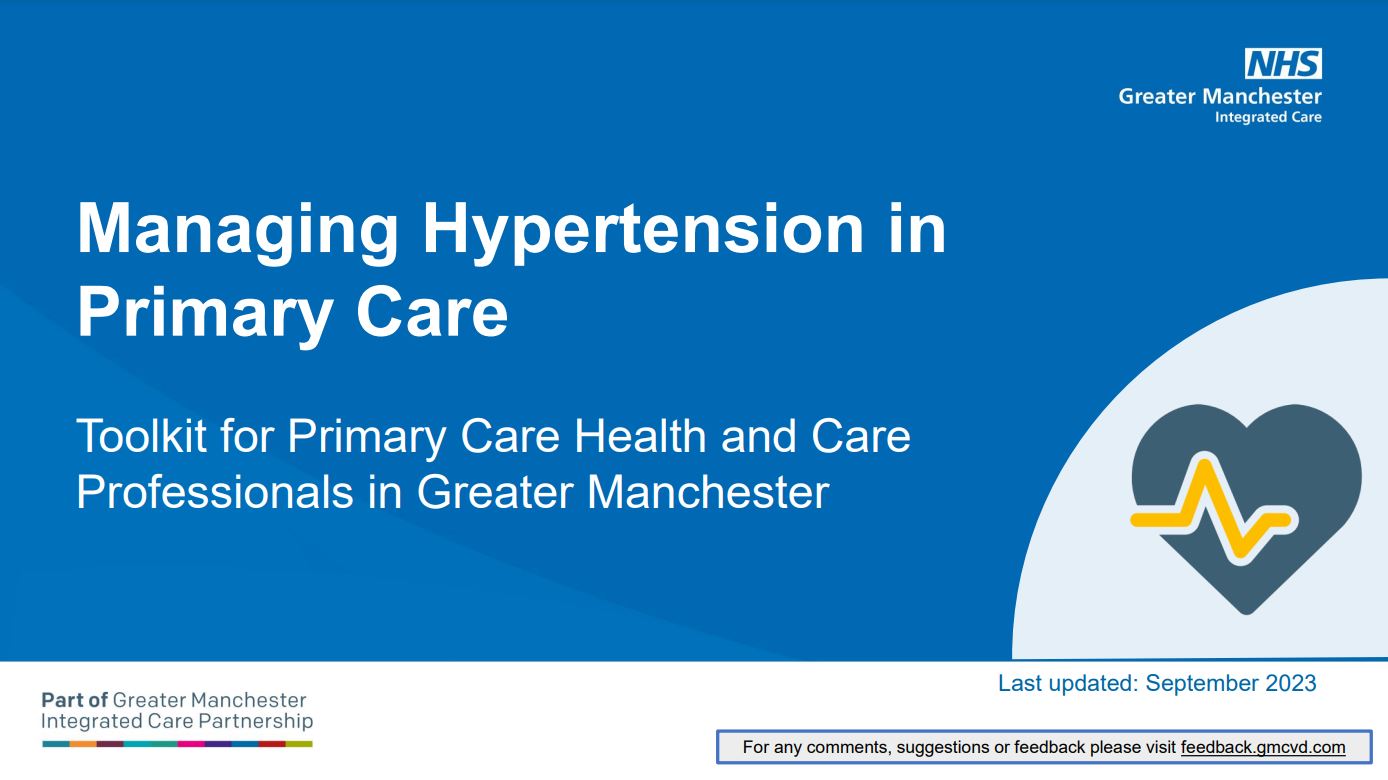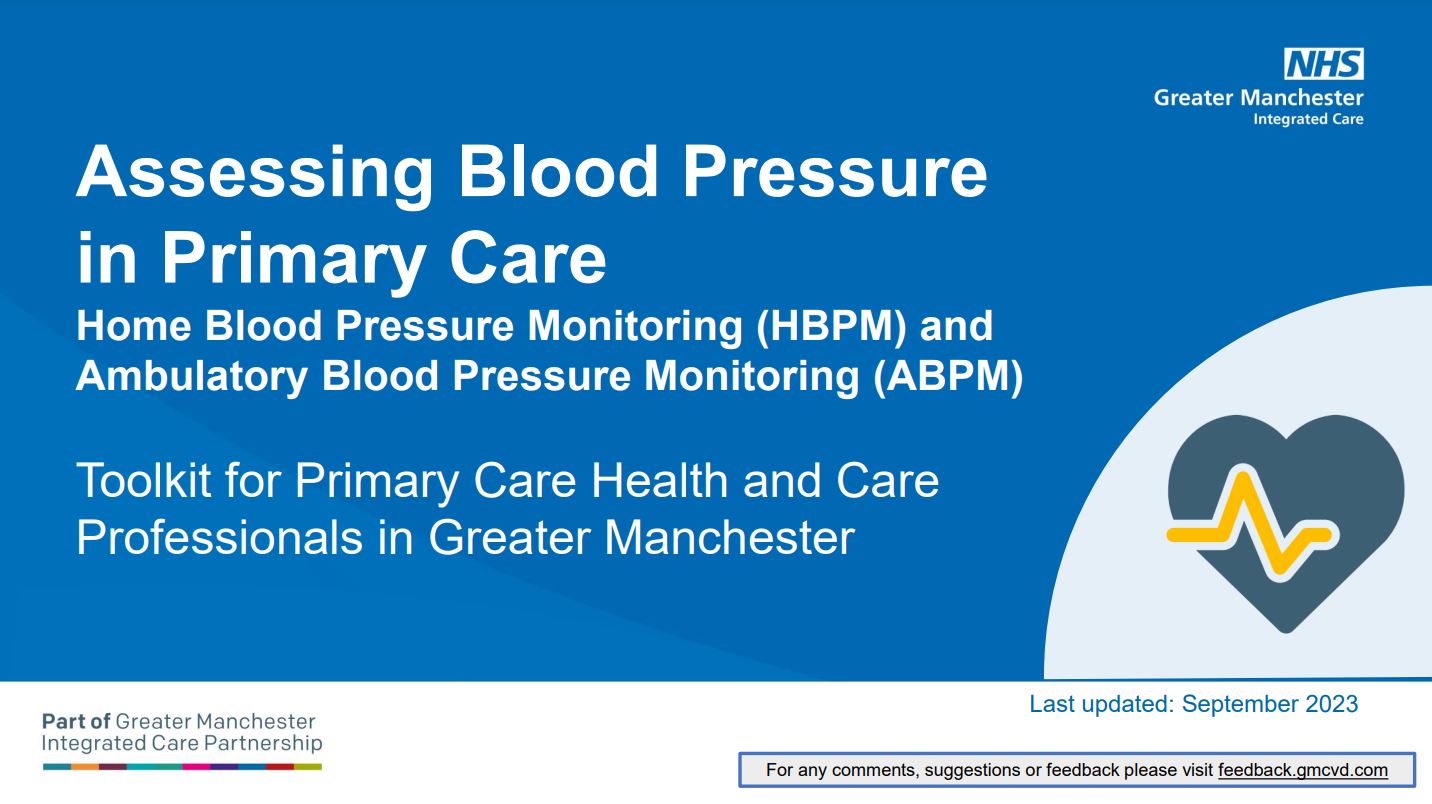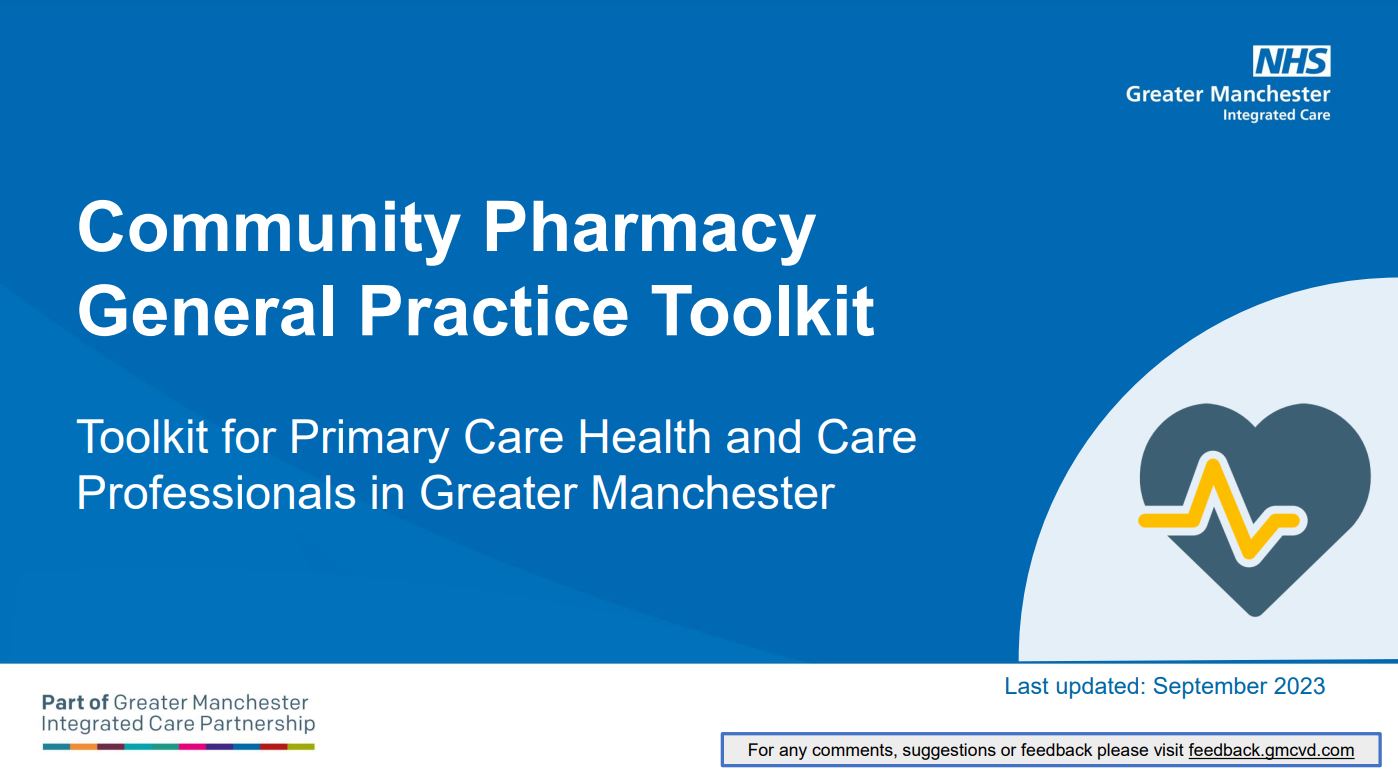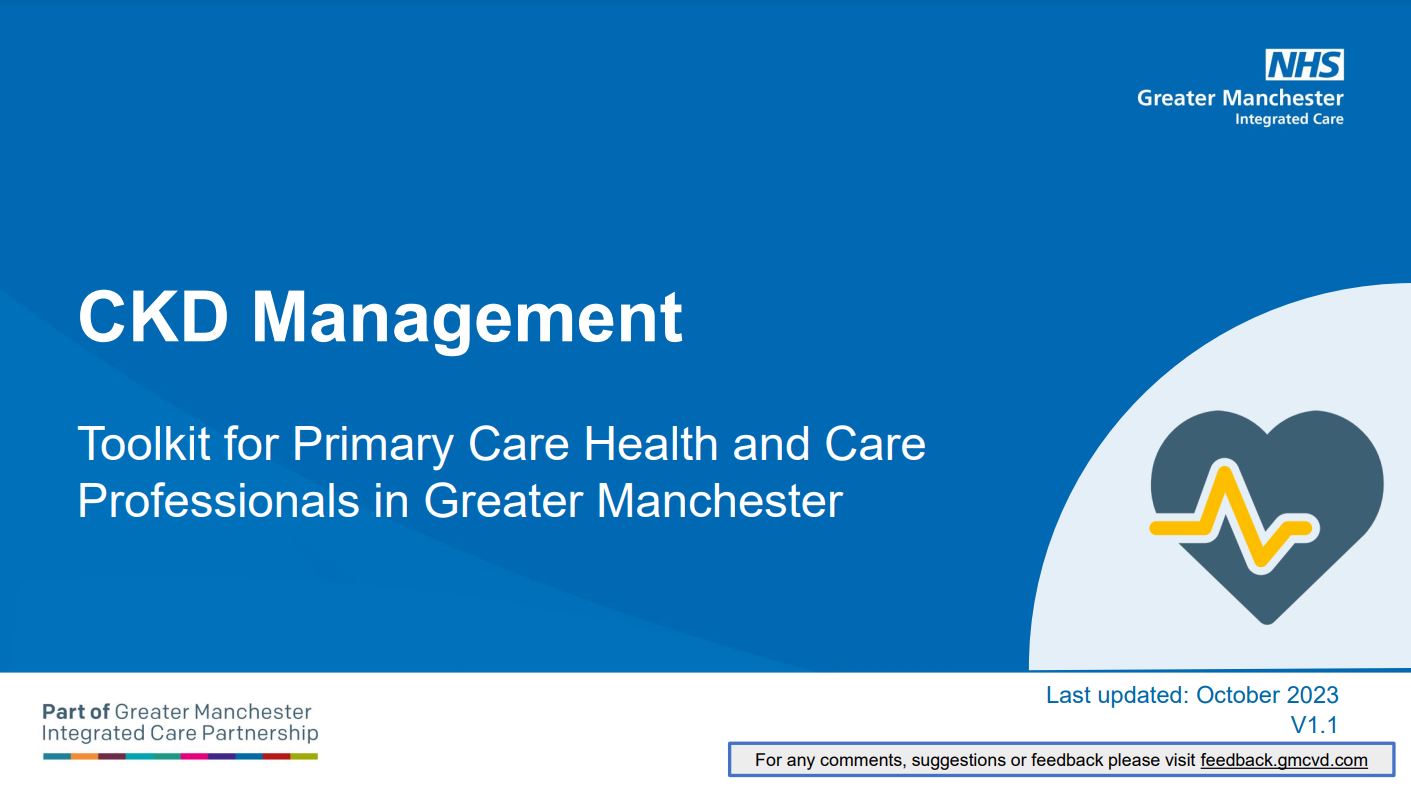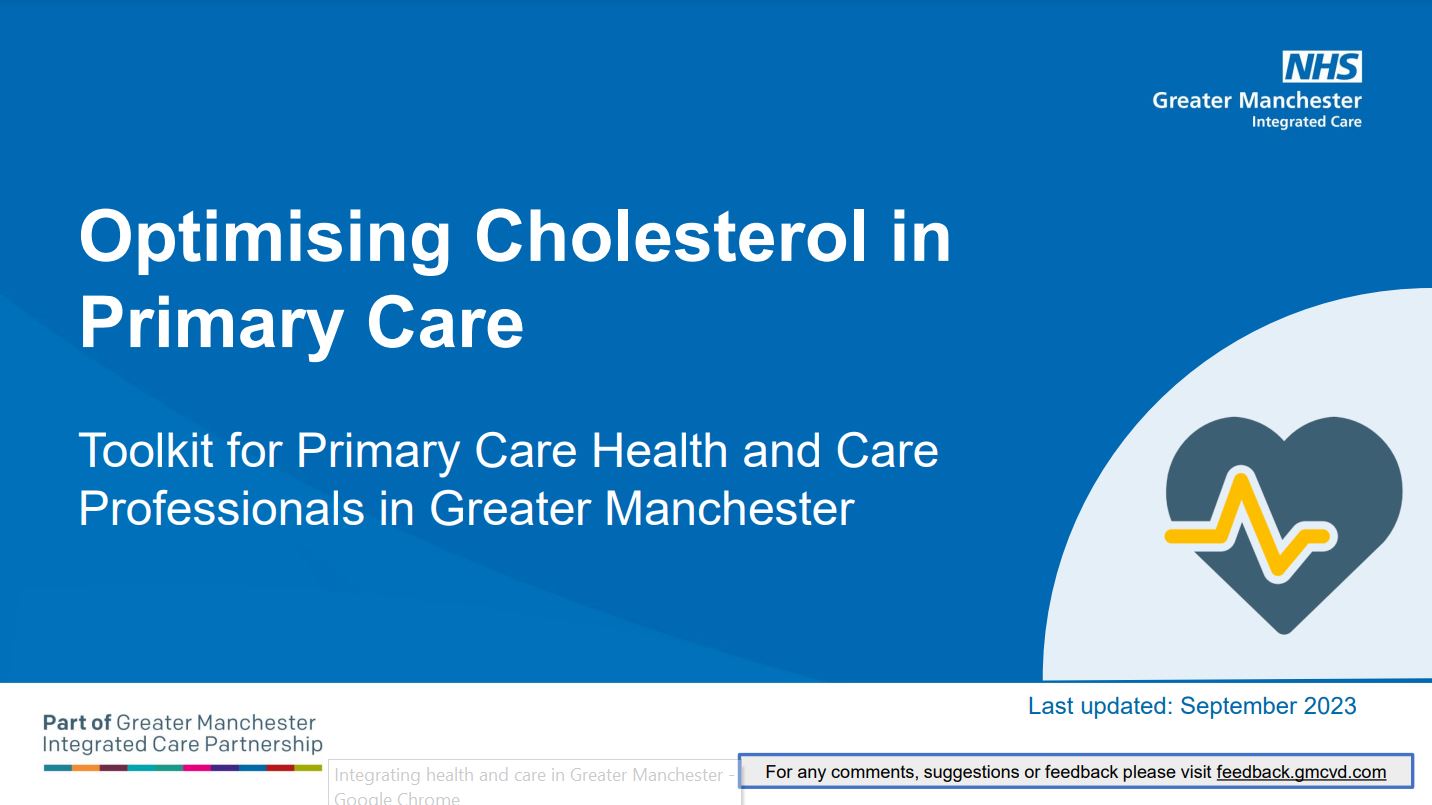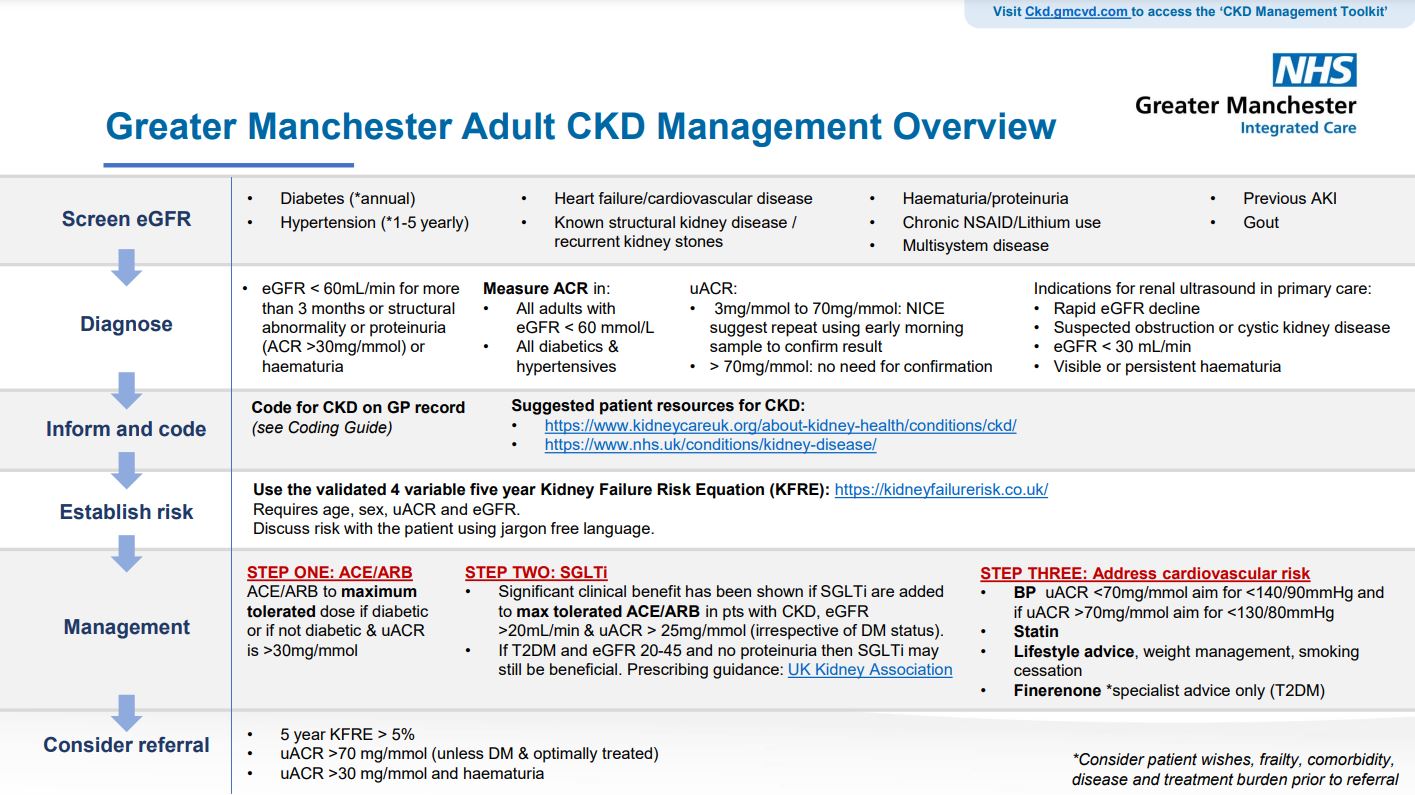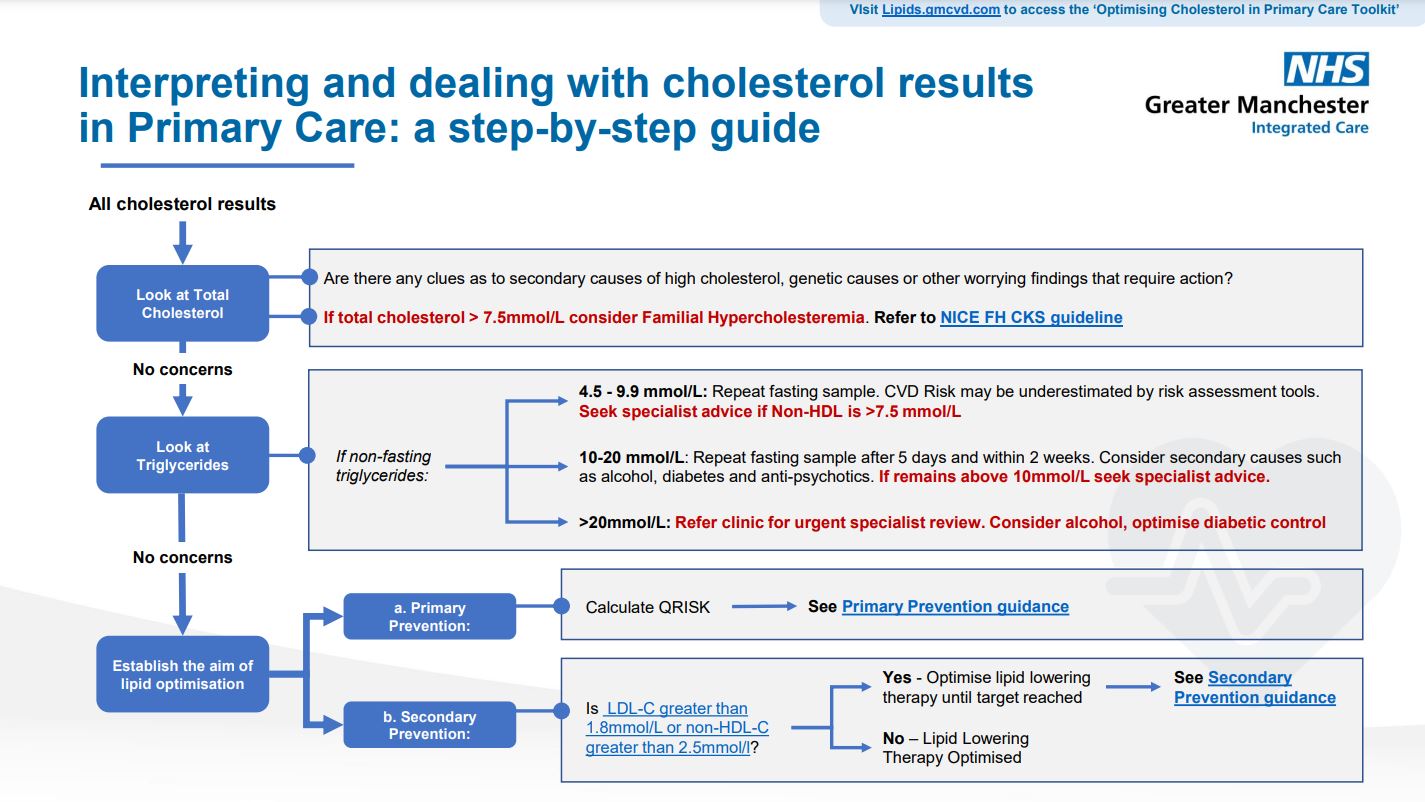CVD Prevention
Resources for Health and Care
The following resources are for health and care professionals, and are being shared as part of the Greater Manchester Integrated Care Systems CVD Prevention initiative. For information or support, please contact [email protected].
CVD Prevention Toolkits for Health and Care professionals in Greater Manchester
Now available! A range of CVD Prevention Toolkits for Health and Care professionals in Greater Manchester have been created in collaboration with NHS GM Integrated Care, Health Innovation Manchester, the Greater Manchester and Eastern Cheshire Strategic Clinical Networks, the Greater Manchester Neurorehabilitation and Integrated Stroke Delivery Network, and the North West Kidney Network. Bookmark resources.gmcvd.com to easily access the latest CVD Prevention Resources.
Click on each image below to access each toolkit.
Lipid Management Pathway for the Secondary Prevention of CVD
The following pathway for the secondary prevention of cardiovascular disease was approved by the Greater Manchester Medicines Management Group (GMMMG) on 30th January 2023.
Quality and Outcomes Framework guidance for 2024/25
Two new indicators related to cholesterol and lipid management directly link to the lipid optimisation workforce support offer:
- LDL-C management for secondary prevention is a clinical priority for patients and the NHS, as recognised by incentives in the 2024/25 QOF amounting to 30 points.
- The 2024/25 updates of QOF include a non-HDL target in the preceding 12 months that is 2.6 mmol/L or lower, or LDL cholesterol in the preceding 12 months that is 2.0 mmol/L or lower, for secondary prevention patients.
- The 2.0 mmol/L LDL-C target in the QOF may not be reachable for some patients with statins alone.
- Additional lipid lowering therapy options are now included in the Greater Manchester Lipid Management Pathway for Secondary Prevention of Cardiovascular Disease (CVD)
- Many high-risk CVD patients could still benefit from further treatment optimisation and combinations of therapies within the lipid management pathway
- CHOL003: To achieve this indicator patients within these registers will need to have a prescription for a statin or other lipid lowering therapy on their records at the point that the QOF data pull
- CHOL004: To achieve this indicator patients within these secondary prevention registers will need to have a non-HDLC or LDLC reading at or below these targets within the 12-month QOF Period.
- This means many patients will require additional optimisation of their lipid lowering therapy during this time window. UK guidance requires a 12 week wait from initiation of therapy to re-testing of lipids. This means practices will need to undertake lipid optimisation work by 31.12.24 in order to get the appropriate follow up test result in the system before the QOF data is pulled from the system.
Lipid Management Pathway Education Webinars
Lipid Management Webinar
Click here to access the pdf of the Lipid Management Webinar.
Chapter Shortcuts
Chapter 1: Importance of Lowering Cholesterol
Chapter 2: What’s in the Lipid Profile?
Chapter 3: Lipid Management Pathways
Chapter 4: Statins and Statin Intolerance
Chapter 5: Lipid Lowering Therapies
Chapter 6: Optimising Lipid Treatment in CVD
Chapter 7: Familial Hypocholesterolaemia
Chapter 8: Hypertriglyceridemia
Chapter 9: Case Finding
Inclisiran Education Webinar
Click here to access the pdf of the Inclisiran Education webinar.
Chapter Shortcuts
Chapter 1: PCSK9 and Cholesterol
Chapter 2: How Inclisiran Works
Chapter 3: Safety, Efficacy and Side Effects
Chapter 4: Inclisiran Guidelines: NICE and GMMMG
Chapter 5: Practical Prescribing: Administration, Ordering
Chapter 6: Case Finding
Managing Cholesterol in Greater Manchester - event highlights
Presentations from the Managing Cholesterol in Greater Manchester event in February 2023 provide guidance for healthcare professionals in GM on how to identify high-risk people requiring lipid optimisation for secondary prevention of CVD.
Presentations
1: Introduction
2: GMMMG Lipid Management Documents
3: Case Finding: Practice level – EMIS, SystmOne & Vision
4: Case Finding: GM Care Record
6: Sharing Practice for Lipid Management Delivery (Pharmacist delivery; Physician associates-led clinic; PCN/Practice-hub delivery model)
7: Q&A
Case Finding and Searches
Searches for the identification of high-risk people requiring lipid optimisation for secondary prevention of CVD have been developed.
The searches risk-stratify patients into five cohort groups depending on intervention required and includes eligibility for injectable therapies.
Disclaimer:
‘Greater Manchester CVD Prevention- Lipids Searches’ have been created by Greater Manchester Integrated Care Partnership and are proprietary to Greater Manchester Integrated Care Partnership. By downloading and running the ‘Greater Manchester CVD Prevention- Lipids Searches’, users confirm:
- That the search tools must be used in accordance with any instructions supplied by Greater Manchester Integrated Care Partnership.
- You understand the criteria on which they are based.
- You understand the search tools can only identify those patients who have been correctly coded into the Electronic Health Record. Greater Manchester Integrated Care Partnership is not responsible for primary care health record coding.
- You will acknowledge Greater Manchester Integrated Care Partnership in any communications with third parties and the public about this work.
- Except to the extent our liability cannot be excluded by law, assume full responsibility for all decision and consequences of implementing the search and stratification tools along with the wider framework.
- That you will not use or exploit these tools for research or commercial gain.
Adaptation of the search tools by primary care teams (e.g. PCN/ GP Practice/ ICS):
The ‘Greater Manchester CVD Prevention- Lipids Searches’ have been created specifically for Greater Manchester Integrated Care Partnership. Therefore, additional validations will be required by PCN/ GP practice/ ICS when adapting the search.
Primary Care/ PCN users are able to amend the search and stratification tools to reflect local preferences. In such instances, Greater Manchester Integrated Care Partnership is not responsible for any outputs. In this case users must state that they have adapted the ‘Greater Manchester CVD Prevention- Lipids Searches’. Suggested wording: “Adapted from Greater Manchester CVD Prevention- Lipids Searches.”
Adaptation of the search tools by suppliers:
Adaptation by distributors (e.g. organisations that share templates to other organisations) must replicate the ‘Greater Manchester CVD Prevention- Lipids Searches’ in entirety without adaptation. Where they wish to adapt the frameworks, they must contact Greater Manchester Integrated Care Partnership for permission.
Guidance documents for searches are available for download on the links below.
Case Finding and Searches Using TPP/SystmOne
Case Finding and Searches Using EMIS
Case Finding and Searches Using InPS Vision
Lab coding issues
This suite of searches (below) includes total cholesterol values where there may be local lab coding issues for LDL / Non-HDL results. Please only use this set of searches if there are coding issues
Patient Information
Inclisiran Prescribing, Ordering and Cost Information
Primary Care Lipid Management Competency Framework
The Primary Care Lipid Management Competency Framework lists the competencies for the National Lipids Programme Workforce Support Programme.
The competencies have been developed based on the Summary of National Guidance for Lipid Management for Primary and Secondary Prevention of cardiovascular disease (CVD).
Access the document below:
Frequently Asked Questions
We have tried to liaise with all of the laboratories in GM. Non-Fasting Lipids will give a calculated LDL-C which may be used. If the triglycerides are raised then it may not be possible to calculate an LDL-C in which case the equivalent Non-HDL may be used. If the LDL-C/Non-HDL-C is near the cut off for eligibility for an injectable it would then be worth repeating a fasting lipid.
The lower your cholesterol the lower your risk of atherosclerotic CVD. If you have no cholesterol it is not possible to have ASCVD. While we have chosen an absolute value as a cut off , this is for pragmatic reasons. Statins are very cheap and extremely cost effective although further statins would entail additional work in the form of blood tests, monitoring and rare side effects. The ongoing discussions to widen the eligibility to statins are therefore more a public health measure rather than a purely clinical/medical one. As the statin discussion is purely based on risks of future events which may or may not happen, this highlights the importance of personalised care and shared decision making as different people have different attitudes towards medicines and the cost/effort of taking statins may or may not be worth the reduction in risk for different people.
While not 100% confirmed it appears that both EMIS and NHSE are hopeful that QRISK2 will be remaining within EMIS following April 2023. We are working on a mitigation plan; regardless all practices should ideally batch-run QRISK2 within their clinical software in March 2023 in case it is removed.
A prescription (FP10) or a Patient Specific Direction is required for administration by anyone other than a qualified prescriber. If an FP10 is used and taken to a community pharmacy for dispensing, the practice will not receive the difference between the price the injection is purchased for and the amount it is reimbursed at (£10). Practices are generally recommended to use the same mechanism as they would for practice administration of Vitamin B12 or leuprorelin injections etc.
There is not a GM Primary Prevention Lipid pathway. There is no formal GM guidance regarding a threshold for pharmacological intervention.
The cost price of the injection is at £45 (Nominal Charge). Inclisiran, as an injectable treatment, is considered a personally administered (PA) item for non-dispensing practices.
For non- dispensing practices: Practices submit claims to the NHSBSA via the FP34PD submission document used for all claims for PA items. The claims will be made via an FP10 form via EPS. Practices are reimbursed £50 per injection (the £45 Nominal Charge plus £5 from 01.04.23). GP practices will be entitled to the appropriate dispensing fee, as set out in Annex G of the Statement of Financial Entitlements Directions 2021
VAT is payable on inclisiran when ordered directly from the wholesaler (AAH). Inclisiran, as an injectable, is considered a PA Item and a VAT allowance is added to payment claims, at the prevailing VAT rate, in recognition of this incurred cost. As indicated by section 16 of the General Medical Services Statement of Financial Entitlements
See ‘Summary information on the funding and supply of inclisiran’ for more information (April 2023 version)
In addition, there are two new indicators related to cholesterol and lipid management (Tackling CVD through 2023/24 QOF). These total 30 points and £36 million in funds
- CHOL001: Percentage of patients on the QOF Coronary Heart Disease, Peripheral Arterial Disease, Stroke/TIA or Chronic Kidney Disease Register who are currently prescribed a statin, or where a statin is declined or clinically unsuitable, another lipid-lowering therapy (14 points)
- CHOL002: Percentage of patients on the QOF Coronary Heart Disease, Peripheral Arterial Disease, or Stroke/TIA Register, who have a recording of non-HDL cholesterol in the preceding 12 months that is lower than 2.5 mmol/L, or where non-HDL cholesterol is not recorded a recording of LDL cholesterol in the preceding 12 months that is lower than 1.8 mmol/L (16 points)
- CHOL001: To achieve this indicator patients within these registers will need to have a prescription for a statin or other lipid lowering therapy on their records at the point that the QOF data pull
- CHOL002: To achieve this indicator patients within these secondary prevention registers will need to have a non-HDLC or LDLC reading at or below these targets within the 12-month QOF Period. The current percentage achievement of this indicator in Manchester ICB is 24.66% (ref Data Explorer | CVDPREVENT).
- This means many patients will require additional optimisation of their lipid lowering therapy during this time window. UK guidance requires a 12 week wait from initiation of therapy to re-testing of lipids. This means practices will need to undertake lipid optimisation work by 31.12.23 in order to get the appropriate follow up test result in the system before the QOF data is pulled from the system.
Further Resources
Heart UK have a variety of resources available for health professionals working with lipid conditions:
- Resources for healthcare professionals: access here.
- Tackling Cholesterol Together: HEART UK has partnered with the NHS Accelerated Access Collaborative (AAC) and the Health Innovation Network to provide a comprehensive and varied education programme for healthcare professionals. Access resources here.
- Resources for patients: access information for patients on cholesterol here
Podcast: Cholesterol Management in General Practice
The ‘Primary Care Knowledge Boost’ podcast aims to improve the confidence and knowledge of local primary care clinicians through interviews with specialists from around Greater Manchester.
Dr Aseem Mishra is an Academic GP trainee who has been involved in helping produce the Guidelines for the Greater Manchester Lipid Pathway. Dr Mishra talks through guidelines for how to treat hyperlipidaemia, recent changes to these guidelines, and injectable treatments for secondary prevention. Follow the link to listen and access further resources.
